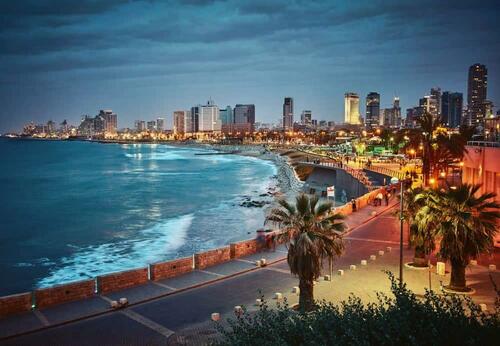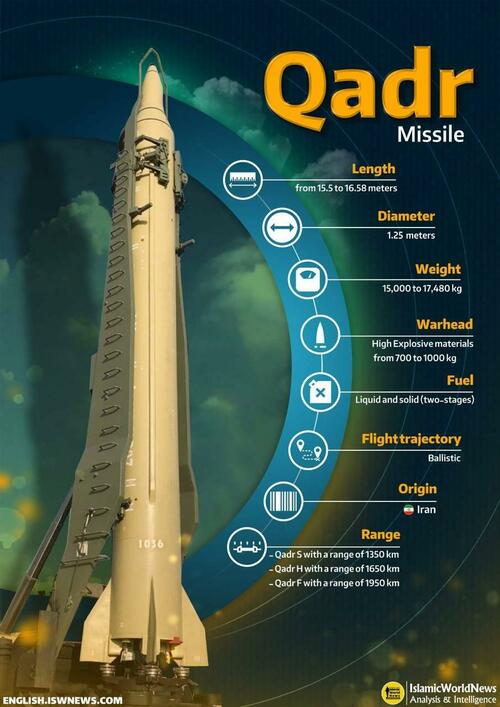
Yesterday marked a first where Hezbollah targeted an Israeli naval base south of Haifa with a missile salvo. And today marks another new major first: Israel says it has intercepted a Hezbollah ballistic missile aimed at Tel Aviv. It marks a first of the war and the deepest Hezbollah has ever tried to send a projectile into Israel.
"The Israeli military said it intercepted the surface-to-surface missile, which set off air-raid sirens in Tel Aviv and across central Israel," Associated Press reports. "There were no reports of casualties or damage." In retaliation Israel's military (IDF) said it struck a site in south Lebanon from where the missile was launched.
Hezbollah later said it was targeting the command headquarters of Israel’s Mossad spy agency. Given the intercept, the effort didn't appear to come close, but it strongly suggests there could be more waves of strikes targeting Tel Aviv to come. The projectile was reportedly intercepted by Israel's David's Sling system, a medium-range defense system.
Israeli military spokesperson Nadav Shoshani characterized the missile as "heavy" and "long range." He described, "It’s the first time that Hezbollah has fired toward Tel Aviv." According to more confirmation of the unprecedented action from CNN:
The Iran-backed militant group Hezbollah confirmed it launched a Qadr 1 ballistic missile targeting the headquarters of Israel’s intelligence service Mossad, which it blames for attacks targeting its members, including the coordinated explosions of thousands of pagers and walkie-talkies last week.
The attempt to attack Tel Aviv appeared a retaliation effort for the Tuesday death of Hezbollah’s top missile commander Ibrahim Muhammad Qabisi. Israeli jets struck his home in a southern Beirut neighborhood, in a strike which Lebanese officials said killed six and wounded 15.
An IDF spokesman described that in total on Tuesday Hezbollah fired 300 projectiles into Israel, resulting in six people wounded.
In Lebanon, Monday marked the single deadliest day since the 2006 war with Israel. The Health Ministry said over 490 people were killed, among these 90 women and children. It is unclear how many of the total were militants, with some reports saying the majority of casualties are civilians.
Rare sirens and a ballistic intercept over Tel Aviv:
A significant first: Hezbollah fired a surface-to-surface (ballistic) missile at central Israel, Tel Aviv this morning.
— Clash Report (@clashreport) September 25, 2024
— Hezbollah says it targeted targeted the Mossad headquarters near Herzliya with Qader 1 ballistic missile.
— Israel's David's Sling system, a medium-range… pic.twitter.com/qMpNbbjb8r
While it's clear the two sides are finally in a 'war' - there could yet still be more escalation given the IDF has yet to launch a ground operation inside southern Lebanon. Iran has also yet to directly enter the conflict, and Syria has appeared to play it safe as well. The head of the Israeli army’s Northern Command, Major General Ori Gordin, has said in new statements issued to his forces that they should "strongly prepare" for a ground offensive.
Gen. Gordin addressed troops who are reportedly conducting exercises simulating a ground invasion. He said the campaign "began with a very significant blow to Hezbollah’s capabilities" with a focus on attacking Hezbollah's launch locations, preparing the way for more effective ground maneuvers.
He stressed in the comments that the IDF needs "to change the security situation" and be "strongly prepared to enter Lebanon in a [ground] maneuver." But this could prove more costly to the IDF infantry, given Hezbollah is well known for their ground warfare and guerilla tactics, especially in the context of the 2006 war.
Tens of thousands of south Lebanon residents have continued making their way north amid the heavier airstrikes and fighting. "Our way out was very slow. The traffic was horrible. It was really hard," one woman, identified as Souad Mahde, told a regional outlet. "We moved for a bit and stopped for a bit. There were strikes here and there until we reached Beirut. It took us until evening."
Footage of Hezbollah striking the Mossad headquarters on the outskirts of Tel Aviv with the Qader-1 ballistic missile.#hezbullah #telaviv #Mossad #Israel #lebanon pic.twitter.com/9deovgraAu
— Shubham Kumar (@shubhamViral) September 25, 2024
"Even in Beirut, there is an atmosphere of war. Of course, we are in a war," she said, given there's been at least three major airstrikes on the capital of the last several days.
The fact that Hezbollah is now launching ballistic missiles toward Tel Aviv is likely to hasten more Israeli airstrikes on the Lebanese capital, specifically against Hezbollah strongholds in the south. Israel's military says it has hit 60 targets in Lebanon so far on Wednesday. "The strikes destroyed intelligence-gathering tools, command centers, and additional infrastructure used by the enemy to build an intelligence situational assessment," the IDF military said.
* * *
Below: an infograph detailing the Iran-made Qadr ballistic missile which Hezbollah says it fired on Tel Aviv Wednesday...
Yesterday marked a first where Hezbollah targeted an Israeli naval base south of Haifa with a missile salvo. And today marks another new major first: Israel says it has intercepted a Hezbollah ballistic missile aimed at Tel Aviv. It marks a first of the war and the deepest Hezbollah has ever tried to send a projectile into Israel.
“The Israeli military said it intercepted the surface-to-surface missile, which set off air-raid sirens in Tel Aviv and across central Israel,” Associated Press reports. “There were no reports of casualties or damage.” In retaliation Israel’s military (IDF) said it struck a site in south Lebanon from where the missile was launched.
Hezbollah later said it was targeting the command headquarters of Israel’s Mossad spy agency. Given the intercept, the effort didn’t appear to come close, but it strongly suggests there could be more waves of strikes targeting Tel Aviv to come. The projectile was reportedly intercepted by Israel’s David’s Sling system, a medium-range defense system.
Israeli military spokesperson Nadav Shoshani characterized the missile as “heavy” and “long range.” He described, “It’s the first time that Hezbollah has fired toward Tel Aviv.” According to more confirmation of the unprecedented action from CNN:
The Iran-backed militant group Hezbollah confirmed it launched a Qadr 1 ballistic missile targeting the headquarters of Israel’s intelligence service Mossad, which it blames for attacks targeting its members, including the coordinated explosions of thousands of pagers and walkie-talkies last week.
The attempt to attack Tel Aviv appeared a retaliation effort for the Tuesday death of Hezbollah’s top missile commander Ibrahim Muhammad Qabisi. Israeli jets struck his home in a southern Beirut neighborhood, in a strike which Lebanese officials said killed six and wounded 15.
An IDF spokesman described that in total on Tuesday Hezbollah fired 300 projectiles into Israel, resulting in six people wounded.
In Lebanon, Monday marked the single deadliest day since the 2006 war with Israel. The Health Ministry said over 490 people were killed, among these 90 women and children. It is unclear how many of the total were militants, with some reports saying the majority of casualties are civilians.
Rare sirens and a ballistic intercept over Tel Aviv:
A significant first: Hezbollah fired a surface-to-surface (ballistic) missile at central Israel, Tel Aviv this morning.
— Hezbollah says it targeted targeted the Mossad headquarters near Herzliya with Qader 1 ballistic missile.
— Israel’s David’s Sling system, a medium-range… pic.twitter.com/qMpNbbjb8r
— Clash Report (@clashreport) September 25, 2024
While it’s clear the two sides are finally in a ‘war’ – there could yet still be more escalation given the IDF has yet to launch a ground operation inside southern Lebanon. Iran has also yet to directly enter the conflict, and Syria has appeared to play it safe as well. The head of the Israeli army’s Northern Command, Major General Ori Gordin, has said in new statements issued to his forces that they should “strongly prepare” for a ground offensive.
Gen. Gordin addressed troops who are reportedly conducting exercises simulating a ground invasion. He said the campaign “began with a very significant blow to Hezbollah’s capabilities” with a focus on attacking Hezbollah’s launch locations, preparing the way for more effective ground maneuvers.
He stressed in the comments that the IDF needs “to change the security situation” and be “strongly prepared to enter Lebanon in a [ground] maneuver.” But this could prove more costly to the IDF infantry, given Hezbollah is well known for their ground warfare and guerilla tactics, especially in the context of the 2006 war.
Tens of thousands of south Lebanon residents have continued making their way north amid the heavier airstrikes and fighting. “Our way out was very slow. The traffic was horrible. It was really hard,” one woman, identified as Souad Mahde, told a regional outlet. “We moved for a bit and stopped for a bit. There were strikes here and there until we reached Beirut. It took us until evening.”
Footage of Hezbollah striking the Mossad headquarters on the outskirts of Tel Aviv with the Qader-1 ballistic missile.#hezbullah #telaviv #Mossad #Israel #lebanon pic.twitter.com/9deovgraAu
— Shubham Kumar (@shubhamViral) September 25, 2024
“Even in Beirut, there is an atmosphere of war. Of course, we are in a war,” she said, given there’s been at least three major airstrikes on the capital of the last several days.
The fact that Hezbollah is now launching ballistic missiles toward Tel Aviv is likely to hasten more Israeli airstrikes on the Lebanese capital, specifically against Hezbollah strongholds in the south. Israel’s military says it has hit 60 targets in Lebanon so far on Wednesday. “The strikes destroyed intelligence-gathering tools, command centers, and additional infrastructure used by the enemy to build an intelligence situational assessment,” the IDF military said.
* * *
Below: an infograph detailing the Iran-made Qadr ballistic missile which Hezbollah says it fired on Tel Aviv Wednesday…
Loading…






